(完整版)四年级下册一般现在时.docx
(完整版)一般现在时课件
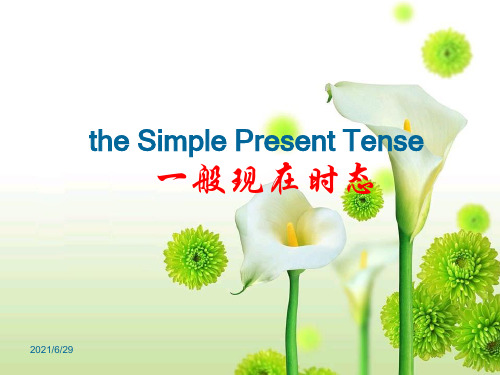
一般疑问句: Be+主语+表语?
Are your parents doctors? Yes, they are./No, they aren’t. Is Mr Long 28 years old? Yes, he is./No, he isn’t.
2021:表示行为动作的词语
3. 经常、习惯、反复做的事情 We have lunch at 12:30. We go to school on Monday.
2021/6/29
be 动词的一般现在时:
be: am, is, are
用be动词的适当形式填空: I ‗a‗m‗‗ he‗‗is‗‗ she ‗i‗s‗‗
iti‗s‗‗‗ Tomis‗‗‗‗
否定句:
☺主语(I/We/You/They)+do+ not+动词原形+其他 I don’t watch TV on Sunday. ☺主语(He/She/It)+does +not+动词原形+其他 He doesn’t watch TV at home on Sunday.
2021/6/29
Practice:
5. 特殊情况 have– has
把下面的行为动词变为第三人称单数形式:
go―goes
carry―carries ride―rides
open―opens
have ― has
teach―teaches brush― brushes dey―deys
play―plays
finish―finishes
2021/6/29
1.一般情况直接加s e.g. reads, plays, works, makes
一般现在时(完整版)
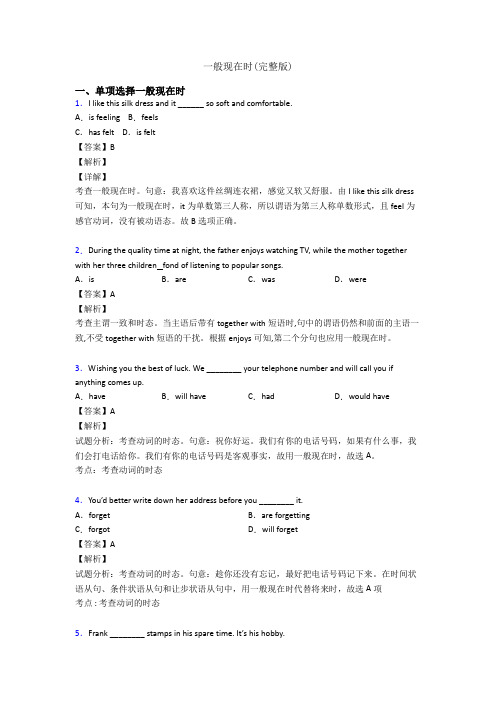
C.won’t haveD.hadn’t had
【答案】B
【解析】
试题分析:考查动词时态及句意理解。句意:因为镇上没有好的餐馆,我们只好在家里用当地食品招待外国客人。虽然句中用yesterday作为时间状语,但是没有好餐馆是现在这一段时间的一个事实,所以应该采用一般现在时态,故B正确。
A.is collectingB.collects
C.collectedD.was collecting
【答案】B
【解析】
试题分析:考查时态。句意:Frank在他的空闲时间收集邮票。这是他的爱好。根据“It’s his hobby”可知,这是Frank经常做的事情。用一般现在时,故选B。
考点:考查时态
【答案】D
【解析】
【详解】
考查时态。句意:时间安排如此紧张,如果他们要完成这个任务,每个人都要全力以赴。在条件状语从句里应该使用一般现在时代替将来时,所以if条件状语从句中使用be to dosth。故D项正确。
16.So far, Mike has spent about $28,000 on the house and __________ it to cost about $38,000 when it is finished and furnished.
18.—I pressed the button just now, but no copies came out.
—The machine _______ well. You must have made an error in operation.
A.runsB.ran
C.had runD.has run
(完整)一般现在时
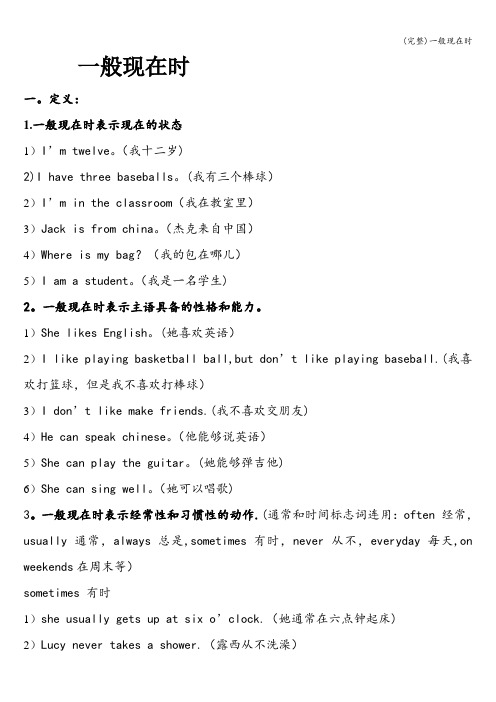
(完整)一般现在时一般现在时一。
定义:1.一般现在时表示现在的状态1)I’m twelve。
(我十二岁)2)I have three baseballs。
(我有三个棒球)2)I’m in the classroom(我在教室里)3)Jack is from china。
(杰克来自中国)4)Where is my bag?(我的包在哪儿)5)I am a student。
(我是一名学生)2。
一般现在时表示主语具备的性格和能力。
1)She likes English。
(她喜欢英语)2)I like playing basketball ball,but don’t like playing baseball.(我喜欢打篮球,但是我不喜欢打棒球)3)I don’t like make friends.(我不喜欢交朋友)4)He can speak chinese。
(他能够说英语)5)She can play the guitar。
(她能够弹吉他)6)She can sing well。
(她可以唱歌)3。
一般现在时表示经常性和习惯性的动作.(通常和时间标志词连用:often 经常,usually通常,always 总是,sometimes有时,never从不,everyday每天,on weekends在周末等)sometimes 有时1)she usually gets up at six o’clock.(她通常在六点钟起床)2)Lucy never takes a shower.(露西从不洗澡)3)We sometimes play basketball after school。
(我们有时在放学后打篮球)4)I always do my homework on weekends(我总是在周末做作业)二.一般现在时谓语动词的变化.一般现在时动词可分为两大类(1)含be(is/am/are)动词和情态动词can一类。
(完整word)上海版牛津英语4B语法总结之一——一般现在时,文档
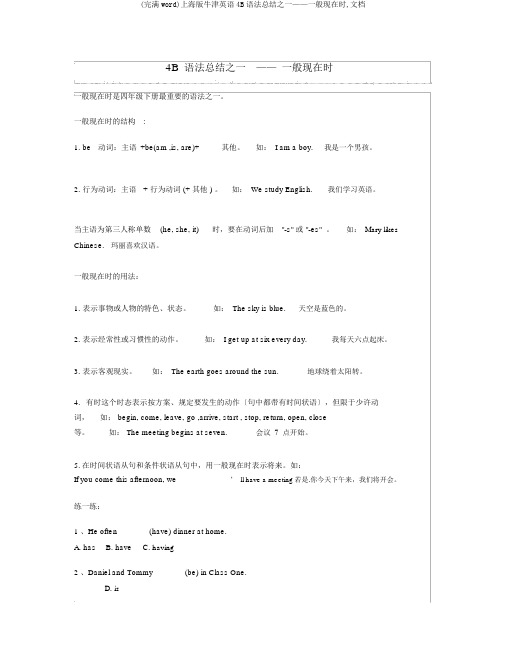
4B语法总结之一——一般现在时一般现在时是四年级下册最重要的语法之一。
一般现在时的结构:1. be动词:主语+be(am ,is, are)+其他。
如:I am a boy.我是一个男孩。
2. 行为动词:主语+ 行为动词 (+ 其他 ) 。
如:We study English.我们学习英语。
当主语为第三人称单数(he, she, it)时,要在动词后加"-s" 或 "-es" 。
如:Mary likes Chinese.玛丽喜欢汉语。
一般现在时的用法:1. 表示事物或人物的特色、状态。
如:The sky is blue.天空是蓝色的。
2. 表示经常性或习惯性的动作。
如:I get up at six every day.我每天六点起床。
3. 表示客观现实。
如:The earth goes around the sun.地球绕着太阳转。
4.有时这个时态表示按方案、规定要发生的动作〔句中都带有时间状语〕,但限于少许动词,如: begin, come, leave, go ,arrive, start , stop, return, open, close等。
如: The meeting begins at seven.会议7点开始。
5.在时间状语从句和条件状语从句中,用一般现在时表示将来。
如:If you come this afternoon, we’ ll have a meeting若是.你今天下午来,我们将开会。
练一练:1 、He often _______(have) dinner at home.A. hasB. haveC. having2 、Daniel and Tommy _______(be) in Class One.D. is3 、The girl _______(teach) us English on Sundays.A. is teachingB. teachC. teachesD. teaching。
一般现在时(完整版)
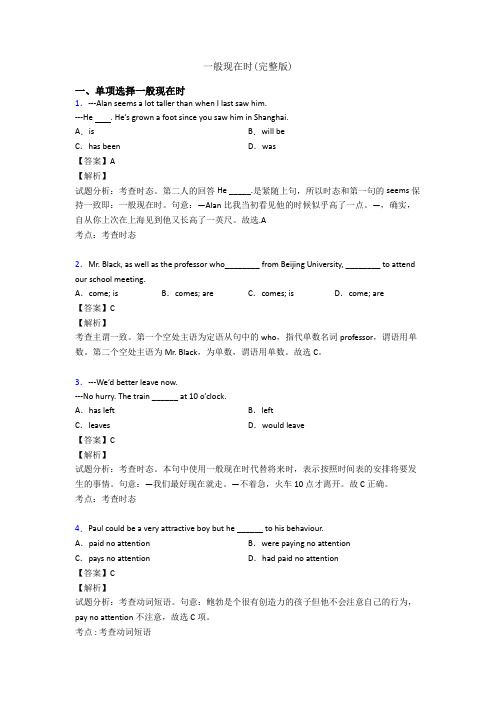
一般现在时(完整版)一、单项选择一般现在时1.---Alan seems a lot taller than when I last saw him.---He . He’s grown a foot since you saw him in Shanghai.A.is B.will beC.has been D.was【答案】A【解析】试题分析:考查时态。
第二人的回答He _____.是紧随上句,所以时态和第一句的seems保持一致即:一般现在时。
句意:—Alan比我当初看见他的时候似乎高了一点。
—,确实,自从你上次在上海见到他又长高了一英尺。
故选.A考点:考查时态2.Mr. Black, as well as the professor who________ from Beijing University, ________ to attend our school meeting.A.come; is B.comes; are C.comes; is D.come; are【答案】C【解析】考查主谓一致。
第一个空处主语为定语从句中的who,指代单数名词professor,谓语用单数。
第二个空处主语为Mr. Black,为单数,谓语用单数。
故选C。
3.---We’d better leave now.---No hurry. The train ______ at 10 o’clock.A.has left B.leftC.leaves D.would leave【答案】C【解析】试题分析:考查时态。
本句中使用一般现在时代替将来时,表示按照时间表的安排将要发生的事情。
句意:—我们最好现在就走。
—不着急,火车10点才离开。
故C 正确。
考点:考查时态4.Paul could be a very attractive boy but he ______ to his behaviour.A.paid no attention B.were paying no attentionC.pays no attention D.had paid no attention【答案】C【解析】试题分析:考查动词短语。
小学阶段的一般现在时

Part Three 一般现在时与其他时态
的区别
与一般过去时的区别
定义:一般现在时表示现在发生的动作或状态,一般过去时表示过去发生的动作或状态
时间状语:一般现在时的时间状语包括now、today、this week等,而一般过去时的时间 状语包括yesterday、last week、ago等
动词形式:一般现在时的动词形式为原形,一般过去时的动词形式为过去式
否定句句型结构
谓语动词前加 助动词do not
(don't)
谓语动词前加 系动词be的一 般现在时形式
谓语动词前加 助动词have not (haven't)
谓语动词前加 助动词助动词 have (has)
一般疑问句句型结构
谓语动词提前:Do you want to go to the park? 助动词提前:Is she a student? 情态动词提前:Can you help me? 疑问词提前:What time does he get up?
用法:表示将来的动作或状态,强调客观事实或普遍真理。
例子:I don't know when he will come back, but if he does, I will let you know.
注意事项:在宾语从句中,一般现在时不能与具体的时间状语连用,如next year、 tomorrow等。
小学阶段的一般 现在时
/单击此处添加副标题内容/
汇报人:XX
目 录
Part One.
一般现在时的基 本概念
Part Two.
小学阶段的一般 现在时用法
Part Three.
一般现在时与其 他时态的区别
小学四年级英语一般现在时
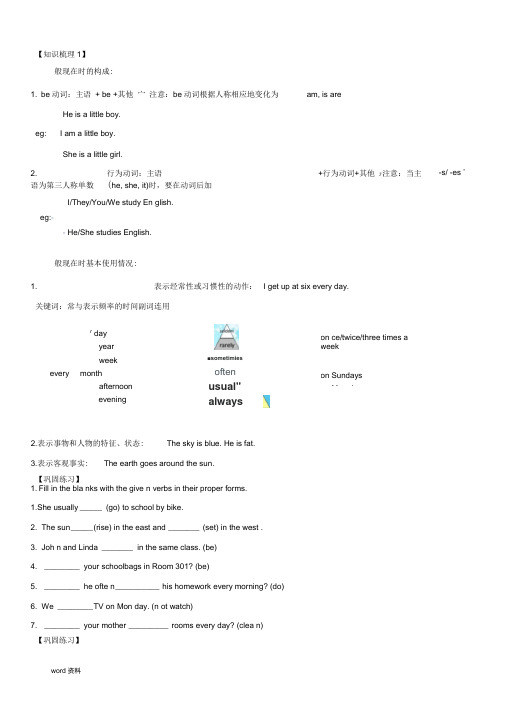
【知识梳理1】般现在时的构成:1. be动词:主语+ be +其他宀注意:be动词根据人称相应地变化为am, is areHe is a little boy.eg: I am a little boy.She is a little girl.2. 行为动词:主语+行为动词+其他T注意:当主语为第三人称单数(he, she, it)时,要在动词后加I/They/You/We study En glish.eg:-- He/She studies English.般现在时基本使用情况:1. 表示经常性或习惯性的动作:I get up at six every day.关键词:常与表示频率的时间副词连用1. Fill in the bla nks with the give n verbs in their proper forms.1.She usually _____ (go) to school by bike.2. The sun _____ (rise) in the east and _______ (set) in the west .3. Joh n and Linda _______ in the same class. (be)4. ________ your schoolbags in Room 301? (be)5. ________ he ofte n __________ his homework every morning? (do)6. We ________ T V on Mon day. (n ot watch)7. ________ your mother _________ rooms every day? (clea n)【巩固练习】-s/ -es 'r dayyeareveryweekmonthafternooneveningoftenusual"always2.表示事物和人物的特征、状态: The sky is blue. He is fat.3.表示客观事实: 【巩固练习】The earth goes around the sun.on ce/twice/three times aweekon Sundayson Mon days■sometimiesI.选择最恰当的答案)1. you have a book?A. DoB. AreC. IsD. Have)2. They on a farm.A. workingB. is workC. workD. is worked)3. ---- Does Peter like to watch TV?A. Yes, he likes )4. She doesn A. doing)5. HowA. do, goB. No, he doesn 'tC. Yes, he ' d likeher homework in the afternoon.B. to doC.doesMr. Brown to America?B. is, goC. does, goD. No, he likesD. doD. does, goes)6. Where ' s my camera? I A. am not finding)7. -HowA. does; go)8.—A. Do; I am)9.A. Is, leaveit.B. am not seeingC. can ' t findD. can ' t look athe go to work?B. do; goesyou usually late for school?B. Does; notshe)10. Mr. YangA. teaches our【知识梳理2】be动词,行为动词句型:1.Be动词一般现在时的句型——He----No,home at six every day?B. Does, leaveEn glish thisterm.B. teaches us肯定句:sb+ be+其他be根据人称变为am,is are to work by bike.C. do; goD. does; goeseg: He is a teacher. I am a student.C. Are; I ' m notD. Are; I aren 'tC. Is, leavesD. Does, leftC. teach usD. teach our They are workers.否定句:sb+ be+not+其他eg: He is not a teacher. I am not a student.They are not workers. 般疑问句:be+sb+其他Is he a teacher? -Yes, he is. / No, he isn 't.Are you a stude nt? Are they workers?1. Mike ______ (like) cooki ng.2. They ______ (have) the same hobby.3. My aunt _____ (look) after her baby carefully.4. You always ______ (do) your homework well.5. I ______ (be) ill. I ' m staying in bed.6. She _______ (go) to school from Mon day to Friday.7. Liu Tao ______ (do) not like PE.8. The child ofte n______ (watch) TV in the evening.9. Su Hai and Su Yang _______ (have) eight less ons this term.10. ---- What day ______ (be) it today? ---- It ' s Saturday.11. 按要求改写句子。
四年级下册英语一般现在时讲解和练习译林版
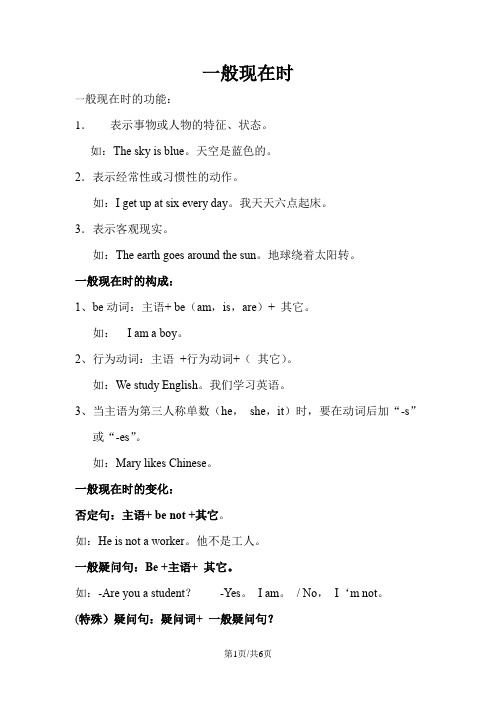
一般现在时一般现在时的功能:1.表示事物或人物的特征、状态。
如:The sky is blue。
天空是蓝色的。
2.表示经常性或习惯性的动作。
如:I get up at six every day。
我天天六点起床。
3.表示客观现实。
如:The earth goes around the sun。
地球绕着太阳转。
一般现在时的构成:1、be动词:主语+ be(am,is,are)+ 其它。
如:I am a boy。
2、行为动词:主语+行为动词+(其它)。
如:We study English。
我们学习英语。
3、当主语为第三人称单数(he,she,it)时,要在动词后加“-s”或“-es”。
如:Mary likes Chinese。
一般现在时的变化:否定句:主语+ be not +其它。
如:He is not a worker。
他不是工人。
一般疑问句:Be +主语+ 其它。
如:-Are you a student?-Yes。
I am。
/ No,I‘m not。
(特殊)疑问句:疑问词+ 一般疑问句?如:Where is my bike?2。
行为动词的变化。
否定句:主语+ don’t(doesn‘t )+ 动词原形(其它)。
如:I don’t like bread。
当主语为第三人称单数时,要用doesn‘t构成否定句。
如:He doesn’t often play。
一般疑问句:Do+主语+动词原形+(其它)?如:Do you often play football?- Yes,I do。
/ No,I don‘t。
当主语为第三人称单数时,要用does构成一般疑问句。
如:- Does she go to work by bike?- Yes,she does。
/ No,she doesn’t。
主语为第三人称单数时,动词的变化规则1.一般情况下,直接加-s,如:cook-cooks,milk-milks 2.以s、x、sh、Ch、o结尾,加-es,如:guess-guesses,wash-washes,go-goes2.以“辅音字母+ y”结尾,变y为i,再加-es,如:study-studies一般现在时用法专练:一、写出下列动词的第三人称单数drink ________ go _______ stay ________make________look_________ have_______pass_______ carry ____come________watch______ plant_______ fly ________study_______ brush________ do_________teach_______wash_______二、用括号内动词的适当形式填空。
- 1、下载文档前请自行甄别文档内容的完整性,平台不提供额外的编辑、内容补充、找答案等附加服务。
- 2、"仅部分预览"的文档,不可在线预览部分如存在完整性等问题,可反馈申请退款(可完整预览的文档不适用该条件!)。
- 3、如文档侵犯您的权益,请联系客服反馈,我们会尽快为您处理(人工客服工作时间:9:00-18:30)。
一般现在时一般在的用法(1)表示常生或性生的作,用一般在。
如:I often watch TV at home.(2)表示客的事,用一般在。
如: There are seven days in a week.一般在的构成当句子主是 I, we, they, you 或复数名,用原形。
当句子的主是he, she, it 或数名,要用第三人称数的在式形。
具体解:特注意特征 ( often usually always sometimes never seldom every+) 在句子中的志作用,在做最好把他出来。
例子: Sheusually does her homework after dinner.注意区分好人称,第一,二人称和第三人称复数只需要用原形,他的否定形式是“don’t+ 原形”,他的疑形式“Do⋯+ 原形⋯?”如果是第三人称数就要作的化。
例子: They go to work by bus on weekdays.They don’ t go to work by bus on weekdays.Do they go to work by bus on weekdays?于句子中的“doesn’ t+原形”及“Do⋯+ 原形⋯?”分是否定和一般疑句的形式,一旦遇“doesn’t ”“两do个” ,必原。
The girl likes eating fruits very much.The girl doesn’ t like eating fruits at all.Does the girl like eating fruits?1. ,特征: often usually always sometimes never seldom every+2.构成:主是一 (I/we). 二人称 (you) 及复数形式 (they):人 /物+原形例子:I/We often go to school on time every day.否定形式:⋯don’t+ 原形例子: I/We don ’t often go to school on time every day.提: Do⋯+ 原形⋯? Yes, ⋯do. No,⋯don’t.例子: Do you often go school on time every day?Yes, I do. No, I don’ t.第三人称数( he/she/it 以及一个人 /物):人 /物 +未尾 +“s或” “es”例子: a. He/She usually goes to school by car every day.b. Janet/Ben has lunch at 12:00 every day.c. The cat eats a fish every day.3.的化:末尾 + “ s或”“ es”(1)一般情况下,在后面+s,如: look---looks eat---eats(2)以“s,”“x” “sh” “ ch尾”的“ o”在尾 +“es,”如: watch---watches wash---washescatch---catches teach---teaches ( 3 )以音字母+“y” 尾的,把“y”改“i再”+“es”,如:fly---flies carry---carriestry---tries(4)特殊形式:have---has4. 否定形式:⋯ doesn’ t+原形例子: The old man plays chess in the morning.The old man doesn’ t play chess in the morning.5.提: Does⋯+ 原形⋯ ? Yes, ⋯ does. No,⋯doesn’ t.例子: Does the old man play chess in the morning?Yes,he does. No, he doesn’ t.巩固正确的答案填空,将其字母号写在前的括号内。
() 1.My mother_______ housework every day.A. didB. doC. does() 2.The lion doesn’t______ the net three times a day.A. bitedB. biteC. biting() 3.He______ a big hole every week.A. makesB. is makingC. made() 4.Does the cat______ a mouse every hour?A. catchB. catchingC. catches() 5.He usually_______ the earth to the hill.A. carryB. carriesC. carrys() 6. My mother always_______ up at half six.A. gotB. getC. gets() 7. She often_____ under a big tree and _____ books in the morning.A. sit ⋯ readsB. sits ⋯ readC. sits⋯ reads () 8. ______ the boy ______ TV on weekdays?A. Do ⋯ watchesB. Does ⋯ watchC. Do ⋯ watch() 9.Their friend______ to the park every two days.A. goB. goesC. going() 10.He never______ a lot of water after he_____ football.A. drinks⋯ playB. drinks⋯ playsC. drink⋯ plays () 11. ____your mother _____ a car to get there every day?A. Does ⋯ driveB. Do ⋯ driveC. Do ⋯ drives() 12. He seldom______ anything.A. forgetB. forgotC. forgets() 13. She often______ over when she______ the baton.A. falls⋯ getsB. falls⋯ getC. fall ⋯ gets() 14.Janet______ the dog every morning.A. feedB. feedingC. feeds() 15.My father_______ well in the evening every day.A. doesn’ t feelB. don ’ t feelC. doesn ’ t feels (二 .在下面的后加 -s 或 -es .(1) catch_________(2) go_________(3) cost_________(4)fish________(5)listen_________(6)do____________(7) fall________(8)show__________(9)brush__________(三 . 翻。
1. I often __________ __________看()in the evening.2. Jack __________ __________踢(足球 ) every afternoon.3. Jane _______ _______( 物 )with her mother on the weekend.4. They all __________(喜 )English teacher.5. Jack often __________睡(觉 )at ten.6. Do they __________ __________吃(晚饭 )at home?7. We often__________跳(舞 )in music class.8. A chair__________(有 )four legs.(四) .用适当的动词形式填空 .(1)Wang Xin usually_________(get) up at 6:30. He________(get) up now .(2)Meihua usually_________(clean) his bedroom on Sunday. Now it ’nines o’ clock.He_________(clean) his bedroom.(3)Bill_________(not like) skipping. He_________(like) running.(4)My mother_________(make) noodles on Sunday. She_________(not make) pasta.(5)-_________ your sister_________(like) coffee? -No, but she_________(like) tea.(6)The bird sometimes_________(fly) high.(7)Today_________(be) my 12th birthday. My grandmother _________(give) me a doll.(8)The girl usually_________(plant) many plants in the spring every year.(9)Our music teacher_________(teach) us music on Monday afternoon.(10)He usually_________ (water) them in the morning.(11)He always_________(clean) slowly and ________(look) left and right(12)The young lady_________(clean) her bedroom every afternoon.(13)She never_________(go) to school late, and she always _________(do) well in class.(14)Usually, Tom _________(water) them two times a day.(15)May usually_________ (plant) many trees in spring.(五).仿照例句 ,写出下列动词的形式.例: sing sings singing(1)cut____________ _____________ (3)swim____________ ____________ (5)get____________ _____________ (7)ask___________ ______________(2) catch_____________ ____________ (4) take_____________ ____________ (6) run___________ _____________ (8)brush_____________ ____________。
